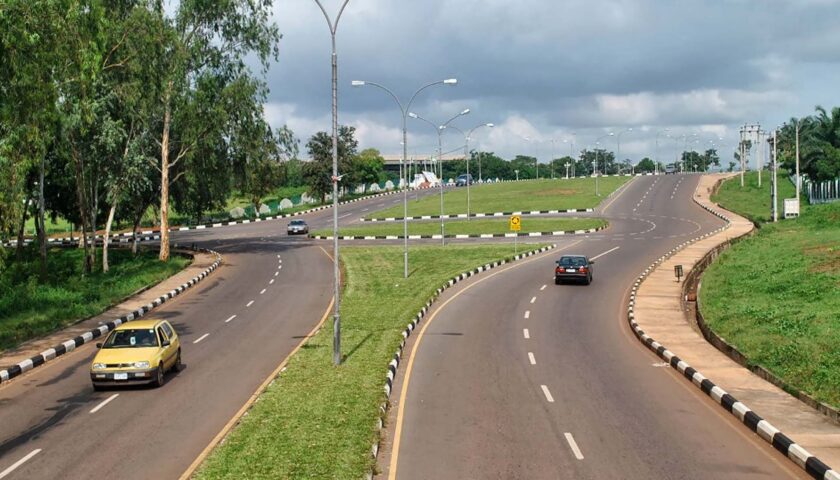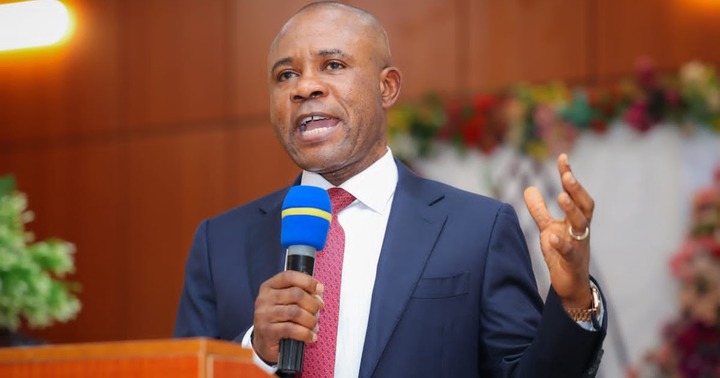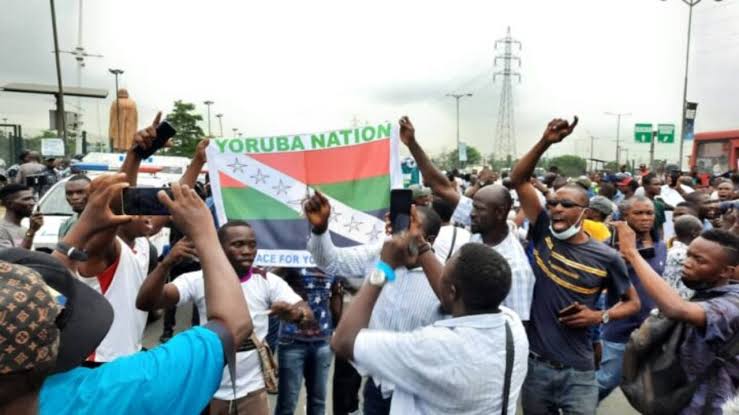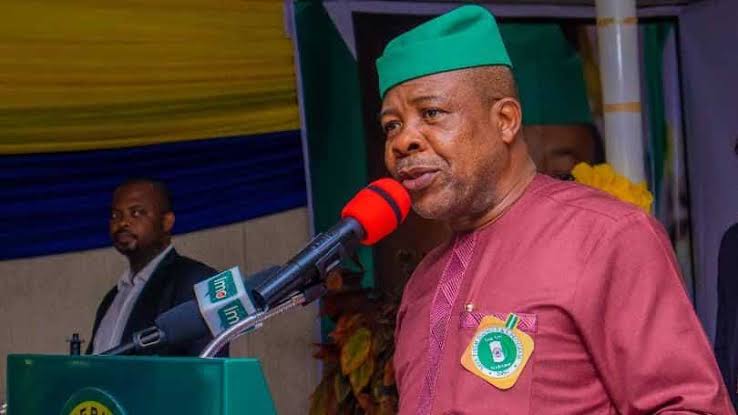By NewsBits
Enugu State Governor-Elect, Mr. Peter Mbah, is in a hurry to take development to an unimaginable level in the state christened Coal City. In this interview, the lawyer and multi-billionaire oil and gas magnate spoke on how he would eradicate poverty in Enugu, tackle insecurity, and what he would achieve in 100 days in office among others.
On his plan for Enugu economy
If you look at the growth pattern in the last 24 years the growth has largely been incremental, marginal. We are going to grow the economy from $4.4 billion to $30 billion within the next eight years.
On how he will achieve zero poverty level in the state
We are going to achieve a zero percent rate in our poverty head count index. By 2031, there will be zero poverty in Enugu. There will be eradication not reduction. It means that we are no longer going to have people living under extreme poverty or below the poverty line.
We are also unique in our strategic objectives because it’s one thing having these massive visions of growing the economy and lifting people out of poverty, but another thing is to craft a strategy to be able to explain to the people how you intend to do that.
That was when we started talking about disrupting the current revenue model which obviously focuses on receipt of revenue from Abuja, going to Abuja at the end of every month to collect money from the federation account and coming back to Enugu to spend it. That money makes it difficult to able to optimally intervene across the critical sectors of our economy. We will deploy a disruptive innovation, critical alternative financing so that we can begin to generate funds from different sources.
Investment plans
If we are going to grow at the levels we have proposed, the growth will not just come from the public sector. It has to come from constructive investment from the private sector. Private sector is going to play a critical role and that’s business. Businesses, as I always say to people on my team, are not Father Christmas, they want return on their investments. So, you are going to have to engage them, explain to them how you will provide the key enablers, key indicators for the ease of doing business, that means the infrastructure, security and also your policies on taxation, the ease of obtaining construction permit, title documents, and enforcing contacts.

There are a lot of core indicators under the ease of doing business that you must necessarily address, even the ease of setting up business and all that. So, we were clear about the different approaches that we are going to deploy to achieve all that.
How we plan to make Enugu investment destination
Our mission is to make Enugu the most attractive state for investment. That means a whole lot. It is also going out there to seek investment, do road shows, invite them for investment forum, market Enugu. But you have to have selling points which you need to say you provided this or that and you can now come and see that Enugu is indeed the preferred location for investment.
Plans for young people
We intend to get them to enhance their skills to compete with their peers across the globe. Our interest in ICT infrastructure is going to address that. We hope to be able to put in the pipeline a minimum of 40,000 young people every year that we are going to get productively and skilfully equipped with ICT skill. That means we are going to have a number of innovation incubation centres, we are going to have it as a cluster across the different senatorial zones.
We are going to work with outsourcing agents across the world to be able to match-make these young people, so immediately they are done with their skill enhancement programmes, we are also providing them with a job that they can sit in Enugu and provide those services and that’s the good thing about the digital economy, that you are upwardly mobile, you don’t have to migrate to the US or Europe in order for you to earn foreign exchange. working with the relevant outsourcing agents, once they have the right skill, we are able to match them with these prospective employers where they can provide services and they are paid while sitting in Enugu.
We are looking at critical mass, so talking about 40,000 is no tea party, you have to have a robust infrastructure to be able to churn out that number of skilful young people every year. In the area of practical skills, our vision is to churn out 10,000 young people in vocational and technical skills. With these young people, our hope is that Enugu will become the next exporter of practical skills.
So, when you are looking for a plumber or electrician, you no longer go to Benin Republic, Cotonou, or Ghana, you start looking towards Enugu because we will build a critical mass of young people with those practical skills.
And that’s what tomorrow will help them to unpack. When we say tomorrow is here, it means, being able to get them skilfully equipped with all the digital and practical skills. We are talking about artificial intelligence, robotics, Augmented reality, virtual reality, and those skills you need to play in the digital space, and we also believe as a state we are going to be the next beneficiary of that because what that means is that there will be huge economic activities.
Just imagine, 40,000 young people. If all they earn is $2000 per month, you are talking about a revenue of close to a billion dollars coming to people sitting in Enugu. And then you will have a robust market and young people with strong purchasing power.
By implication, you can attract industry, manufacturing companies that can come and manufacture in Enugu in a sure knowledge that they have their primary market in Enugu because they have people with the purchasing power to patronize them.
So, these things are going to connect but we have to be there in the forefront as a government to provide those enablers. We believe that these messages resonated with the people of Enugu and when they spoke on March 18, we had no doubt that of course, we are their preferred choice as governor of Enugu State.
We are not unmindful of the people that we defeated even at the primaries who are today still contending that they could have been the winner of the election. But how could you possibly be the winner of the election when you could not win the primaries?

Can you speak on the allegations against you on the NYSC certificate?
By way of background, NYSC is not an event you walk into and at the end of that event they issue you a certificate. It is a process and a programme that lasts for 12 months from when you receive your call up letter to the point when you end the service.
So, it’s either you did it or you did not do it and of course if you have done it, there are people you must have done it with. The truth is that I did my service and I was honourably discharged and I was issued a certificate from NYSC.
Now my story, I did my LLB in the United Kingdom and typically, once you are a graduate of law from overseas when you are back to Nigeria you do what is known as bar part one. The bar part one is exclusively done by overseas graduates and at the end of your bar part one, you then go to join the Nigerian students to do the bar part two, the bar final, as we call it.
So, I started my bar part one, upon completion of my bar part one, we were just completing the bar part one when the bar part two students were going in, so we did not end in time to join the bar part two. We had just ended when the bar part two students were going in.
So, what that meant was that we had to stay back at home and wait till the next Nigerian students were ready to go for their bar part two. We cannot go exclusively as bar part one to start our own programme, I did my bar part one at the Lagos campus of the Nigerian law school. The lesder then was Prof Abayomi of blessed memory. He advised us that instead of staying back at home till the next set of Nigerian students are ready that we should go and do our youth service. Some of us took that advice. For me, I took that advice, and I started my youth service, incidentally, it took some months before the next batch of youth service was ready, so we joined.
Now, midway into the service the bar part two Nigerian students were now ready, and so we were told that our admission was ready for the bar part two programme. I had a choice to either defer the admission or defer the youth service. For me, I was more interested in seniority at the bar, so it was a clear choice to defer the youth service. So, I wrote a letter to NYSC, I did my primary assignment in Lagos and orientation camp was Iyano-Ipaja and I served on Lagos Island, my CD group was the Federal Road Safety Corps. These are all institutions.
I applied for deferment, and they responded, and they said they were going to demobilise me. So, I went on to do my bar final, when I finished my bar final in March, I went for my de-mobilisation, they sent back a letter to me approving that they reinstate me to continue from where I stopped. And they gave me a fresh posting letter whereby I was rejected in NPA. They gave me another posting letter to a law firm and then I started my primary assignment there.
At the end, I had my final clearance letter from my place of primary assignment written to NYSC that I had fulfilled all that I needed to do and should be given my discharge certificate. And the discharge certificate was issued by NYSC to me.
I did not forge my NYSC certificate. The NYSC certificate is printed by the mint, and it is printed serially. So, the only way this could be forged is if this serial number exists with someone else ‘s name and I had to do an imposter for it. The second way is that this serial number does not exist at all and that I sat with some printers and asked them to put this serial number for me.
How soon are you going to hit the ground running and the things to expect in the first 100 days?
Usually, in the first 100 or 200 days are periods referred to as honeymoon when you come in with lots of expectations and you have an opportunity to make an impression riding on high level good will. So, we made some specific promises to the people of Enugu with a timeline. Some of them have also been reduced to an actionable timeline.
For example, water, we told Ndi Enugu that in 180 days, we will ensure that water flows in their homes.
We talked about tackling insecurity and others, we are committed to keeping to these campaign promises because before we made them and ascribed timeline to them, we had a full appreciation of what we needed to do to crack the problems. We are going to keep our campaign promises.
In terms of revenue and where we are on things, whether dealing with soft issues, which again is the second leg of our vision, eradicating poverty. So, we believe intervening in things like gratuities and pension are things that we must do. We have to lift people out of abject poverty.
Our plan for gratuity and pension is to freeze that. We know what the outstanding debt is, arrange finance to clear that over a period of time, have a model that allows for a pay as you go pension, contributory pension scheme. Meanwhile, the basket of debt that we have we would find money to clear It.
Again, what we bring to the table is our strong finance background, the fact that we have done major projects, we had opportunity to structure projects and make sure that they succeed.
The model of revenue we have now will not optimally address the things we have outlined. That is why we keep talking about disrupting that revenue model. For example, looking at our dormant assets and transforming them into productive assets. When you come to our rural economy, that economy has not been touched, nothing is happening in our rural area, and we have a huge expanse of land. And land is so fertile that our productivity is five-fold. So, what you plant in Enugu, if you plant the same thing elsewhere in the North, you will get five times more in Enugu than you get there.
So, our plan is to unlock our rural economy, create special economic zones in the various local governments and in the whole senatorial zone. We have about 100,000 hectares, create access roads to the farmlands and then attract commercial farmers and begin to unlock the revenue potentials we have in Enugu.
So, we are not only going to have food security in terms of our level of production but also, we can process the excess of those foods that we are producing, package, market them and create industries. We will have a whole lot of made in Enugu products because of a whole lot of manufacturing industries.
We have a couple of other financing models we have applied in our manifesto. Another one is the Diaspora bond that we hope to establish.
What programme do you have to tackle insecurity in Enugu State?
Security is key to achieving all our goals. You cannot have sustainable growth without peace and security and at the same time you cannot have peace and security without sustainable growth. So, they are mutually intertwined and that is why we talked about kinetic and non-kinetic approaches to tackling insecurity.
Of course, a non-kinetic approach will be dealing with unemployment and poverty frontally but at the same time strengthening our policing and our security architecture.
We have a robust security plan. We are going to deploy technology to be able to identify and track those criminals, and hoodlums. We have a command and a control centre that we can use to monitor the activities going on around the state. We are going to deploy CCTV and radar to be able to do all these.
What will be your yardstick for selecting your cabinet and how are you going to work with other state assembly members from other parties like the Labour Party? Frankly, our objective is Enugu, greatness, and development of Enugu. To that end, even those members of the state assembly from other parties are also interested in the same goal. As long as we are pursuing a common objective, I have no doubt that we will work together.
As for selecting our cabinet members, we are bringing in people that we are going to execute social performance contracts with. We will be clear about the output targets and mine is to communicate those goals and vision as early as possible and to work with the team of people who have bought into that goal. We have a way of measuring performance either monthly or weekly of the social contract. We will have measurable performance indicators.
This year’s elections were very historical, especially after the presidential election. Can you recount your psychological mood even with the Obidient movement?
If you look at the clamour of the Obidient movement, it speaks competence, capacity and character. We also felt that with the barometer to measure leader and preferred choice, we had no close second.
But we also know that there might also be a followership fatigue where some people, whether real or not, may have perceived that they needed a change to another party. But in terms of competence, we had no problems at all.
On how he campaigned
You will recall that in May last year, we had just emerged as a candidate for PDP in Enugu State and typically, based on the trend and pattern of things over the last 24 years, once you emerge as the PDP candidate, it’s almost taken for granted that you will be the next governor of the state.
Again, in the last 24 years, Enugu has been a PDP state and all the political offices were occupied by PDP which is why it was very key for you to assume things. But we did not take that for granted. We did something that was unique, something that was frankly peculiar because for the previous government, the way they campaign was for governorship candidates to tour various local governments for campaign rallies.
But we took a different view. We felt that we wanted to get granular, reach out to the grassroots. Beyond reaching out to the grassroots we wanted to get to understand their pain points.
So, we went on a tour of the 68 development centres at a town hall meeting where we engaged with the grassroots and all the relevant community-based organizations, professional organizations, CSOs, NGOs at the various developmental centres.
That afforded us the opportunity to sell our message to the people, that message of hope, message of exponential growth, disrupting the status quo and sub-optimisation. We also began to unpack what we mean when we say to them, tomorrow is here. We began to explain to them what that tomorrow holds for them.
So, we engaged them constructively but beyond that, it also afforded us the opportunity to listen and have them talk to us about their pain, challenges, and difficulties. So, it wasn’t a report through a third party, it was I hearing it from them.
Another opportunity it afforded was that we documented the various problems in each local government because from our manifesto, we are trying to unlock our rural areas economy. We are trying to make sure that we have an integrated rural development. So, it was an opportunity for us to identify the potentials of the various local governments, particularly the development centres.
And we took a bold view of what Enugu State can achieve in the next four to eight years under our watch. Obviously, that resonated with the people; of course, we have some doubters, naysayers. We also have some critiques which we welcome because we were basically telling them something that is unprecedented; something that you couldn’t look at and pass.
Source: Vanguard





